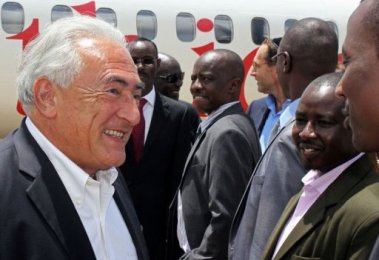Former IMF chief Strauss-Kahn arrives in Juba to open bank
May 13, 2013 (JUBA) – Disgraced former International Monetary Fund (IMF) chief Dominique Strauss-Kahn arrived in South Sudan on Monday to open a new bank, marking a rare return to the financial world since his career was derailed by a lurid sex scandal two years ago.

Few details have been made public about the NCB bank, although AFP quoted officials as saying the Swiss-backed private venture was being launched in cooperation with South Sudanese partners.
Straus-Kahn was greeted by South Sudan’s minister of commerce, Garang Diing, following his arrival in Juba.
“This visit is very important to us … especially in relation to investment attraction to South Sudan,” Diing told AFP.
“He (Straus-Kahn) wants to see how South Sudan is prospering in terms of peace, stability, democracy and economic performance,” he added.
The one-time French presidential hopeful and former IMF boss suffered a spectacular downfall after a New York hotel maid accused him of sexual assault in May 2011.
Strauss-Kahn, who has always insisted his sexual relations with the maid were consensual, was forced to resign his post in the wake of the scandal; in which allegations surfaced he was also criminally involved in a France-based prostitution ring.
In August 2011, prosecutors dropped all criminal charges, saying that the alleged victim, Nafissatou Diallo, was not a credible witness.
Strauss-Kahn quickly returned to France and later settled a civil suit filed by Diallo for an undisclosed sum.
In an extensive interview with France’s weekly Le Point magazine last October, Strauss-Kahn, who now works as a freelance financial consultant, said he was “looking at getting involved in big international projects”.
Although rich in natural resources, South Sudan remains grossly under-developed since splitting from the north in July 2011, with vast sections of the population still living beneath the poverty line.
The country’s economy suffered a spectacular crash in 2012 after the government shut down oil production, following a dispute with Sudan over transit fees to pump its oil to export markets in the north via Sudanese pipelines.
Prior to the shutdown, oil revenues, totalling about $400 million per month, had represented 82 percent of South Sudan’s gross domestic product and 98 percent of government revenues.
The loss of its oil revenues sparked a dramatic economic collapse, with South Sudan’s GDP shrinking by 55 percent in 2012, according to IMF estimates.
The South Sudanese economy has also been plagued by high inflation, driven mostly by increases in food prices – a trend which the World Bank says is the result of limited local food production and a high reliance on imported foods, in combination with depreciation of the South Sudanese pound (SSP) and border closures with the north.
Although oil production resumed in April after both countries reached an agreement ending the 15-month-long row, economic development in South Sudan remains ham-strung by tribal violence, large-scale displacement, ethnic conflict and hunger which continues to plague large sections of the country, following a decades-long civil war with neighbouring Sudan.
(ST)
